Introduction to a Balanced Diet
A balanced diet is a dietary pattern that provides the necessary nutrients, vitamins, and minerals the body requires to function optimally. This concept goes beyond merely counting calories or limiting food groups it encompasses a diverse range of food items that collectively contribute to overall health. The components of a balanced diet include carbohydrates, proteins, fats, vitamins, and minerals, each serving vital roles in maintaining bodily functions.
Carbohydrates, often considered the body’s main energy source, are crucial for fueling physical activity and maintaining cognitive functions. Whole grains, fruits, and vegetables are excellent sources of complex carbohydrates, providing energy and dietary fiber, and aiding digestive health. On the other hand, proteins are essential for growth, tissue repair, and the production of enzymes and hormones. Lean meats, legumes, nuts, and dairy products are valuable protein sources, ensuring the body can efficiently repair itself and maintain muscle mass.
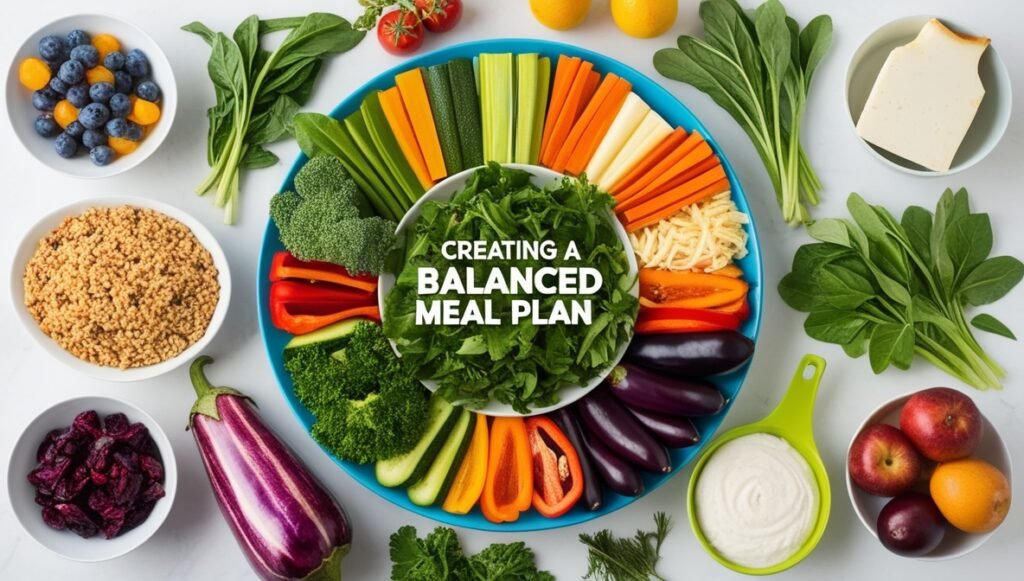
Fats, too, play an indispensable role in a balanced diet. They are vital for hormone production, nutrient absorption, and providing essential fatty acids that the body cannot produce on its own. Including healthy fats, such as those found in avocados, olive oil, and fatty fish, can offer heart health benefits while promoting overall well-being.
Moreover, vitamins and minerals, although required in smaller amounts, are integral to numerous biochemical processes, including immune function, bone health, and wound healing. Ensuring a variety of foods in one’s diet helps to achieve a sufficient intake of these micronutrients.
In summary, variety and moderation are the key to a balanced diet. By incorporating a wide range of nutrient-dense foods, individuals can meet their daily nutritional needs effectively, fostering a healthier lifestyle and enhancing overall well-being.
Key Components of a Balanced Diet
A balanced diet is essential for maintaining optimal health and well-being. It comprises a variety of key components that work synergistically to support bodily functions. The primary constituents of a balanced diet include carbohydrates, proteins, fats, vitamins, and minerals, each playing a significant role in our overall nutrition.
Carbohydrates are the body’s most significant source of energy. They can be classified into simple and complex forms. Simple carbohydrates are found in fruits, honey, and dairy products, whereas complex carbohydrates are present in whole grains, legumes, and starchy vegetables. The recommended daily intake for carbohydrates is about 45-65% of total daily calories, depending on activity levels. This macronutrient not only fuels physical activities but also supports cognitive functioning.

Proteins are vital for the growth and repair of tissues as well as the synthesis of enzymes and hormones. They are made up of amino acids, which can be sourced from both animal and plant-based foods. Daily protein intake should account for approximately 10-35% of total calories. Foods such as lean meats, dairy products, legumes, and nuts are rich in protein and contribute to muscle health and immune function.
Fats, often misunderstood, are essential for hormone production, nutrient absorption, and providing a concentrated energy source. Healthy fats, including monounsaturated and polyunsaturated fats found in avocados, nuts, and olive oil, should be prioritized. The ideal intake of fats should be about 20-35% of total daily calories.
Vitamins and minerals are crucial for various biochemical processes in the body. Vitamins A, C, D, E, and K, along with minerals like calcium, iron, and potassium, support immune functions, bone health, and metabolic processes. A diverse diet rich in fruits, vegetables, whole grains, and lean proteins typically provides adequate levels of these micronutrients.
In maintaining a balanced diet, it is crucial to prioritize incorporating these essential nutrients daily. This practice not only enhances energy levels but also supports overall health and longevity.
The Benefits of Eating a Balanced Diet
Maintaining a balanced diet is critical for achieving optimal mental and physical health. A well-structured dietary plan provides essential nutrients that support bodily functions, contributing to overall well-being. Research consistently shows that individuals who adhere to a balanced diet experience enhanced energy levels, improved mood, and better cognitive function. For instance, a study published in the Journal of Nutrition found that participants who consumed a variety of food groups, including fruits, vegetables, whole grains, and lean proteins, reported higher levels of concentration and creativity compared to those with unbalanced diets.
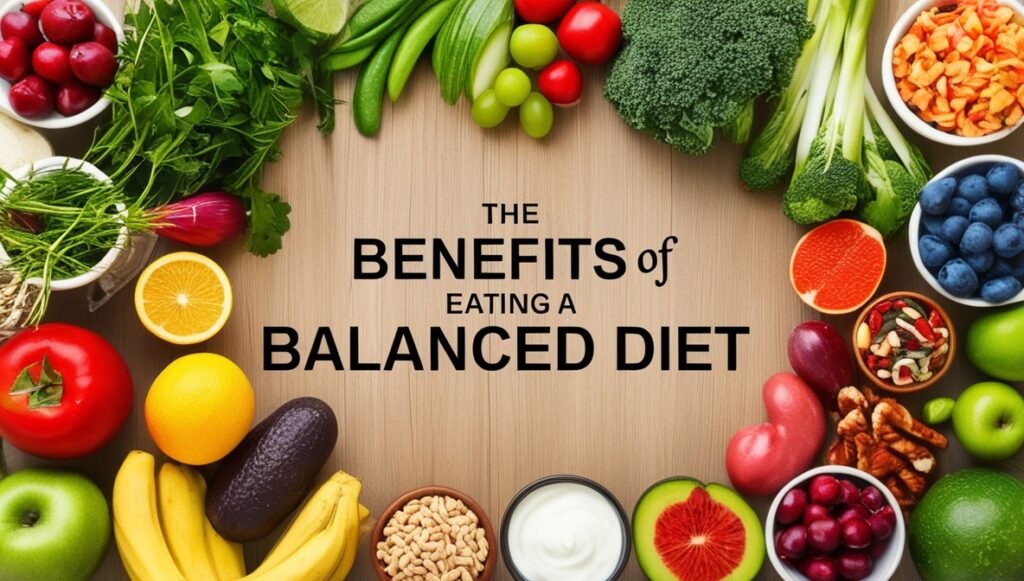
Weight management is another significant advantage associated with eating balanced meals. When individuals prioritize nutrient-dense foods, they are more likely to consume fewer empty calories often found in processed foods. For example, incorporating healthier snacks, such as nuts or yogurt, instead of sugary options can lead to sustained satiety and reduced calorie intake over time. This balanced approach to eating not only aids in weight loss but also assists in maintaining a healthy weight, thereby mitigating potential health risks.
Moreover, a balanced diet plays an essential role in reducing the risk of chronic diseases. Research conducted by the American Heart Association highlights the correlation between balanced eating habits and lower rates of cardiovascular diseases, diabetes, and certain cancers. By integrating various food groups, individuals can ensure they receive adequate vitamins and minerals necessary for bodily defenses. For instance, a Mediterranean diet, rich in fruits, vegetables, and healthy fats, has been associated with lower incidences of heart disease and inflammation.
In summary, the numerous benefits of maintaining a balanced diet extend beyond immediate health improvements. From better mental clarity to effective weight management and a decreased risk of chronic diseases, embracing balanced eating habits is a truly worthwhile investment in long-term health and well-being.
Creating a Balanced Meal Plan
Creating a balanced meal plan necessitates a thoughtful approach to food selection that encompasses all essential food groups, ensuring that individuals receive the necessary nutrients for optimal health. To begin, one should identify the various food groups: fruits, vegetables, grains, proteins, and dairy. Each of these groups contributes unique vitamins, minerals, and macronutrients, which are vital for the body’s functions. A well-structured meal plan should include diverse foods from each group to provide a comprehensive range of nutrients.
When selecting foods, it is beneficial to focus on incorporating a variety of colors and textures. For instance, a vibrant plate filled with leafy greens, bright peppers, and deep purple eggplants not only enhances visual appeal but also indicates a rich supply of antioxidants and phytochemicals. This colorful approach ensures that meals are not only nutritious but enjoyable as well. Additionally, utilizing seasonal ingredients not only supports local agriculture but can also offer better flavor and freshness at a potentially lower cost.

Portion control is a critical aspect of a balanced meal plan. It is essential to be mindful of serving sizes, as consuming excessive portions of even healthy foods can lead to an imbalance in caloric intake. Utilizing measuring tools or visual cues, such as the “plate method,” can aid in maintaining appropriate portions. Meal prepping is another effective strategy that can facilitate adherence to a balanced meal plan. By preparing meals in advance, individuals are more likely to make healthier choices and avoid the temptation of convenient, less nutritious options on busy days.
In conclusion, creating a balanced meal plan involves thoughtful selection from all food groups, a focus on color and variety, understanding portion sizes, and the practice of meal prepping. These strategies work harmoniously to promote long-term health and wellness, underscoring the importance of a balanced diet in everyday life.
Breakfast Ideas for a Balanced Diet
Starting the day with a nutritious breakfast is crucial for maintaining energy levels and promoting overall health. A balanced diet emphasizes the importance of incorporating various food groups, and breakfast should be no exception. Here are some healthy options that align with the principles of a balanced diet, each offering beneficial nutrients to jumpstart your morning.
One excellent choice is oatmeal topped with fresh fruits and nuts. Oatmeal serves as a rich source of fiber, which aids digestion and keeps you feeling full longer. Adding fruits like berries or bananas not only enhances taste but increases vitamins and antioxidants. Nuts, such as almonds or walnuts, provide healthy fats and additional protein, making this breakfast both satisfying and sustainable for energy throughout the day.
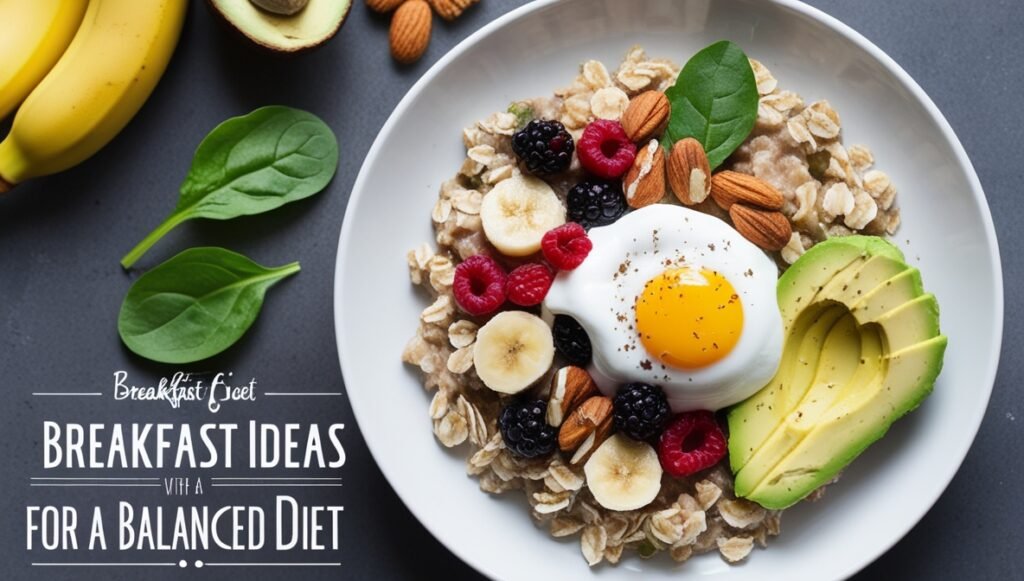
For those pressed for time, a smoothie can be an ideal option. Blending spinach, banana, and a scoop of Greek yogurt offers a dose of greens, potassium, and protein, respectively. Smoothies can be customized with various ingredients, such as berries for added flavor or protein powder to enhance satiety. They are not only quick to prepare but also easy to consume on the go, making them a convenient choice for busy mornings.
Another simple yet nutritious breakfast idea is avocado toast. Whole-grain bread provides complex carbohydrates, while avocado contributes healthy monounsaturated fats and a range of vitamins. Topping the toast with poached eggs adds protein and enhances the meal’s nutritional profile. This combination promotes fullness and stabilizes blood sugar levels, aligning perfectly with a balanced diet.
Ultimately, a variety of healthy breakfast options can easily fit into a busy lifestyle, supporting the principles of a balanced diet. By choosing combinations that offer protein, healthy fats, and fiber, you can create delicious meals that nourish your body and set a positive tone for the day ahead.
Brunch: The Perfect Balance
Brunch serves as an essential meal option that bridges the gap between breakfast and lunch, making it a perfect opportunity to enjoy a healthy and balanced diet. A well-planned brunch should incorporate proteins, healthy fats, and whole grains to provide the body with the necessary nutrients for sustained energy throughout the day. By carefully selecting the ingredients, one can craft an array of creative and nutritious brunch options that are not only pleasing to the palate but also beneficial for overall health.
Starting with proteins, it is crucial to include sources such as eggs, which are rich in high-quality protein and provide essential amino acids. For a delightful dish, consider preparing a spinach and feta omelet, which combines the benefits of eggs with the vitamins and minerals found in spinach, alongside the flavor of feta cheese. Alternatively, consider a quinoa salad enriched with chickpeas and diced vegetables, offering a hearty protein boost while being packed with fiber and nutrients.
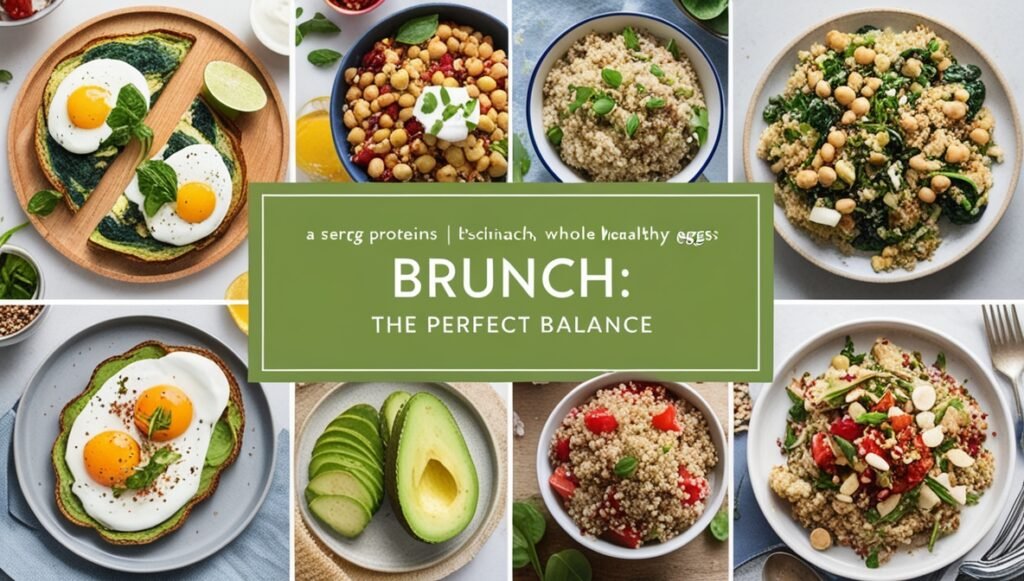
Healthy fats are another important component of a balanced brunch. Avocado toast is a popular choice that not only delivers healthy monounsaturated fats but also provides a satisfying texture. Spread ripe avocado on whole-grain bread and top it with sliced tomatoes and a sprinkle of seeds for added crunch and nutrients. Greek yogurt, rich in probiotics and healthy fats, can be served with a variety of toppings such as nuts and fresh fruit for a delicious parfait that also meets the criteria of a balanced meal.
Whole grains play a significant role in maintaining energy levels and aiding digestion. Incorporating steel-cut oats into your brunch can create a warm, comforting bowl topped with berries or a drizzle of honey. This wholesome approach ensures that your meal is both nourishing and satisfying. By diversifying your brunch options with these components, you can enjoy delicious meals that nourish your body and contribute positively to your overall diet.
Lunch Choices for Sustained Energy
A balanced lunch is crucial for maintaining sustained energy levels throughout the day. It is essential to incorporate a variety of food groups to create meals that not only satisfy hunger but also provide the nutrients necessary for optimal performance. A well-rounded lunch typically includes lean proteins, whole grains, and an abundant serving of vegetables.
One effective approach is to assemble a quinoa salad enriched with colorful vegetables such as bell peppers, tomatoes, and spinach. Quinoa serves as a fantastic source of whole grains, offering complex carbohydrates to fuel the body. Adding a source of lean protein, such as grilled chicken or legumes like chickpeas, enhances the meal by promoting muscle repair and satiety, ensuring you remain energized through the afternoon.

Another excellent lunch option is a whole-grain wrap filled with turkey, avocado, and mixed greens. The wrap provides necessary fiber and energy, while the turkey, a rich source of protein, helps stave off post-lunch fatigue. Avocado not only introduces healthy fats into the meal but also contributes to heart health and satisfaction.
For those looking for convenient packing methods, consider utilizing containers that separate your components, keeping the freshness and flavors intact. Invest in quality, reusable lunchboxes that contain sections for different food groups, making it easy to prepare balanced meals ahead of time. It is advisable to include cut fruits or yogurt as snacks to maintain hydration and energy levels throughout the day.
Ultimately, the key to a balanced lunch lies in variety and nutritional diversity. By thoughtfully incorporating vegetables, lean proteins, and whole grains, you can ensure your meals support your daily activities and overall well-being. This balanced approach will not only aid in sustaining energy but also contribute to long-term health benefits.
Evening Snacks: Healthy Choices
Evening snacks serve as an essential component of a balanced diet, particularly for those who seek to maintain energy levels without excessive calorie intake. To ensure your late-night cravings are met without compromising dietary goals, selecting nutritious options is key. Healthy evening snacks can not only satisfy hunger but also contribute essential nutrients to your daily diet.
One excellent option is a small serving of Greek yogurt, which offers a rich source of protein and probiotics. Pairing it with a handful of mixed berries can enhance both flavor and antioxidant content while keeping sugar levels in check. The combination of yogurt and fruit makes for a delightful snack that promotes satiety and digestive health.
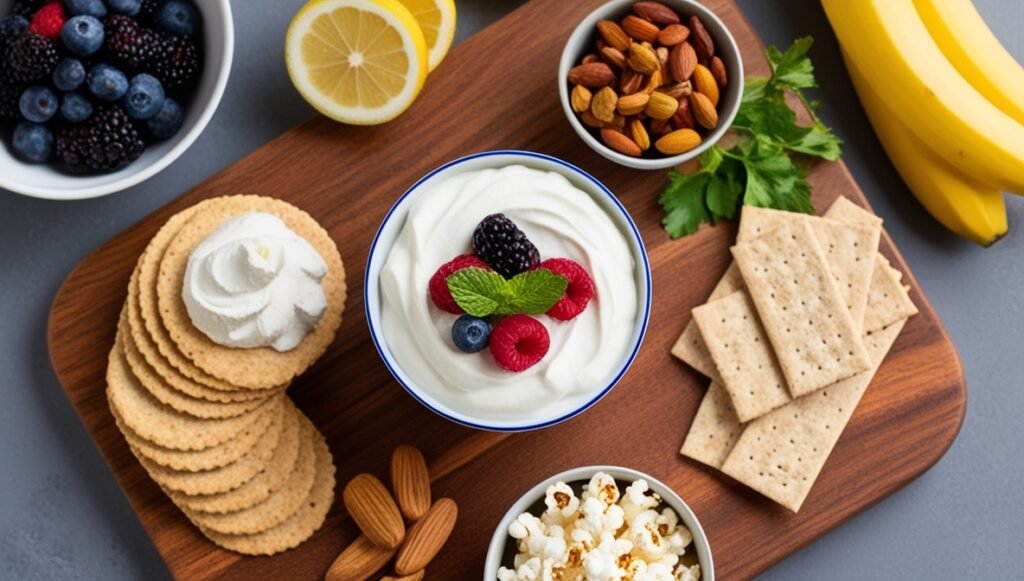
Another satisfying option includes whole-grain crackers topped with hummus. Whole grains are an excellent source of fiber, supporting digestive health and providing sustained energy. Hummus, made from chickpeas, not only offers protein but also healthy fats, making this duo a balanced way to curb those evening cravings.
For those seeking a warm snack, consider air-popped popcorn seasoned with a pinch of sea salt or nutritional yeast. Popcorn is a whole grain and contains fiber, which can help you feel full. Just be mindful of portion sizes to avoid excessive calorie consumption, as it is easy to overindulge with this tasty snack.
Practicing mindful eating while enjoying evening snacks is essential for maintaining a balanced diet. Take the time to savor each bite, and pay attention to your body’s hunger and fullness cues. This approach can contribute to a greater appreciation of food and assist in preventing overeating.
In making these healthy choices, you can engage in enjoyable eating patterns that satisfy your cravings while promoting overall health, thus supporting your commitment to a balanced diet.
Dinner: Concluding the Day Right
As the final meal of the day, dinner plays an essential role in maintaining a balanced diet. To craft a satisfying and nutritious evening meal, it’s important to incorporate various food groups, ensuring that the necessary vitamins, minerals, and macronutrients are included. A well-rounded dinner could consist of lean proteins, whole grains, and a variety of colorful vegetables, contributing to your overall health and well-being.
For example, consider preparing grilled salmon, which is high in omega-3 fatty acids, alongside a quinoa salad rich in fiber and protein. Incorporating seasonal vegetables, such as roasted Brussels sprouts or steamed asparagus, not only adds vibrant colors to the plate but also enhances the nutrient profile of the meal. An ideal dinner should encompass at least three different food groups; this diversity ensures a comprehensive range of nutrients to support the body overnight.
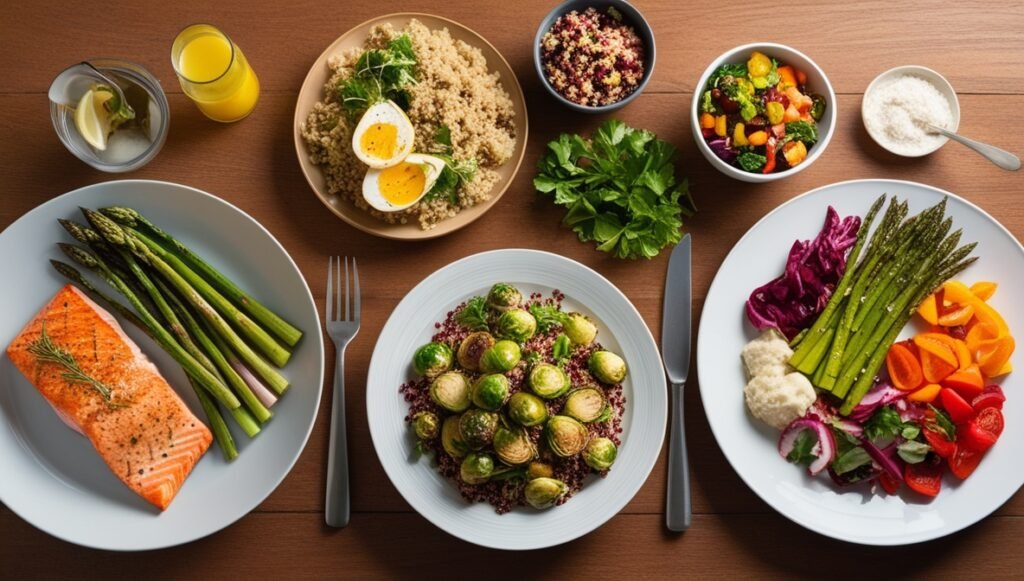
Moreover, cooking methods play a pivotal role in maintaining the integrity of the meal. Methods such as steaming, grilling, and baking are preferable, as they help to preserve the essential nutrients found in vegetables while reducing the need for added fats. On the other hand, frying and overcooking can diminish the nutritional value of the food, making it less effective for a balanced diet. Utilizing fresh herbs and spices can enhance flavors without the need for excessive salt or sugar, promoting healthy eating habits.
In terms of preparation, planning meals ahead of time can alleviate the stress of cooking on busy weekdays, allowing for more thoughtful choices. Batch cooking certain components, like grains or proteins, can save time and ensure that a balanced dinner is always within reach. By considering variety, cooking methods, and meal preparation, dinner can become a delightful and nourishing experience that complements a balanced diet.

Some really fantastic work on behalf of the owner of this site, perfectly outstanding subject matter.
Good write-up, I am normal visitor of one¦s blog, maintain up the excellent operate, and It is going to be a regular visitor for a long time.
Thank you very much for your valuable feedback. you can check more articles too.
Thank you very much for your valuable feedback. you can check more articles too.